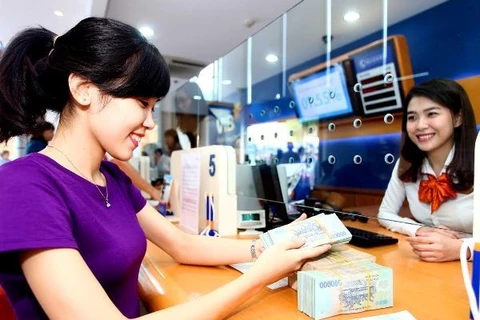Hanoi (VNA) – The COVID-19 pandemic is developing complicatedly and badly affecting the global economy, including Vietnam, causing adverse impacts on production and business activities as well as people’s lives.
Many domestic enterprises have been struggling to survive by taking different ways. Experts said the COVID-19 outbreak has been testing the resilience of local businesses.
Though there are no complete statistics on the number of enterprises affected by the epidemic, the banking sector, as the backbone of the economy, has continuously adopted solutions to remove difficulties for and support domestic enterprises.
Leaders of banks affirmed they had mapped out scenarios and plans to offer preferential interest rates, lending interest rate reductions and exemptions and new loans to help domestic firms and save themselves.
Enterprises facing hardships
Statistics from the State Bank of Vietnam (SBV) showed that although many credit packages in support of enterprises have been rolled out, the banking industry’s credit growth has reached only 0.1 percent, lower than the figure of 0.85 percent in the same period last year. This is the lowest growth rate over the past six years.
A survey conducted among 1,200 businesses in different fields such as agriculture, industry and service indicated that almost 74 percent of them are likely to go bankrupt if the COVID-19 pandemic lasts for six months as their revenues cannot offset operational costs, salaries for employees and payments for premises rent.
Nguyen Ngoc Anh, Director of Omega Tour, said all tours booked with the company in March and April have been cancelled. Meanwhile, the company has managed to have hundreds of millions of dong each month to pay insurance premiums, salaries for employees and operational costs.
“We had to slash 30 percent of our workforce and retained some units to maintain operations and their salaries were halved,” he said.
The pandemic has forced the Cuong Huynh General Trading & Services Co. Ltd. to halted operations of nearly 40 big coaches, resulting in the unemployment of hundreds of drivers and employees.
Nguyen Huy Cuong, director of the company, said banks have reduced interest rates for the company and enabled it to pay lending interest only but not principal until the end of this year.
Businesses operating in other fields such as garment-textiles, transport, retail, aquaculture, oil and gas and securities have also been facing the same difficulties.
According to the State Bank of Vietnam’s estimates, local companies have failed to repay 926 trillion VND worth of outstanding loans (40 billion USD) on schedule due to the impact of the pandemic, accounting for 11 percent of the total loans. The fact has prevented businesses from getting new loans.
Banks suffer “dual” impacts
Statistics showed that the credit provided by local banks in the first two months of 2020 reached only 5 trillion VND (216.3 million USD).
Nguyen Quoc Hung, Director of the SBV’s Credit Department, attributed the low credit growth in the first two months of the year to the impacts of the COVID-19 pandemic that forced domestic enterprises to shrink their production and business.
A leader of the Joint Stock Commercial Bank for Investment and Development of Vietnam (BIDV) unveiled that the bank’s credit in the two months reduced nearly 2 percent as few customers need loans at the beginning of the year while the pandemic has also affected their demand for capital.
The Joint Stock Commercial Bank for Foreign Trade of Vietnam (Vietcombank) estimated its due loans have amounted to 120 trillion VND (5.2 billion USD), meaning that the bank would cut interest for the loans by 300-450 billion VND.
The Vietnam Prosperity Joint Stock Commercial Bank (VPBank) said among its clients, around 1,000 enterprises have been affected by COVID-19 and the number is likely to go up if the pandemic persists and develops more complicatedly.
Financial expert Nguyen Tri Hieu said many enterprises have witnessed stagnant operations or even suspended operations, resulting in a low demand for capital.
A research report released recently by SSI Securities Corporation forecasted that the banking industry would suffer from adverse impacts in the short-term due to the COVID-19 pandemic that is spreading in the world. In addition to lower credit growth, the sector is likely to face increasing bad debts./.


























